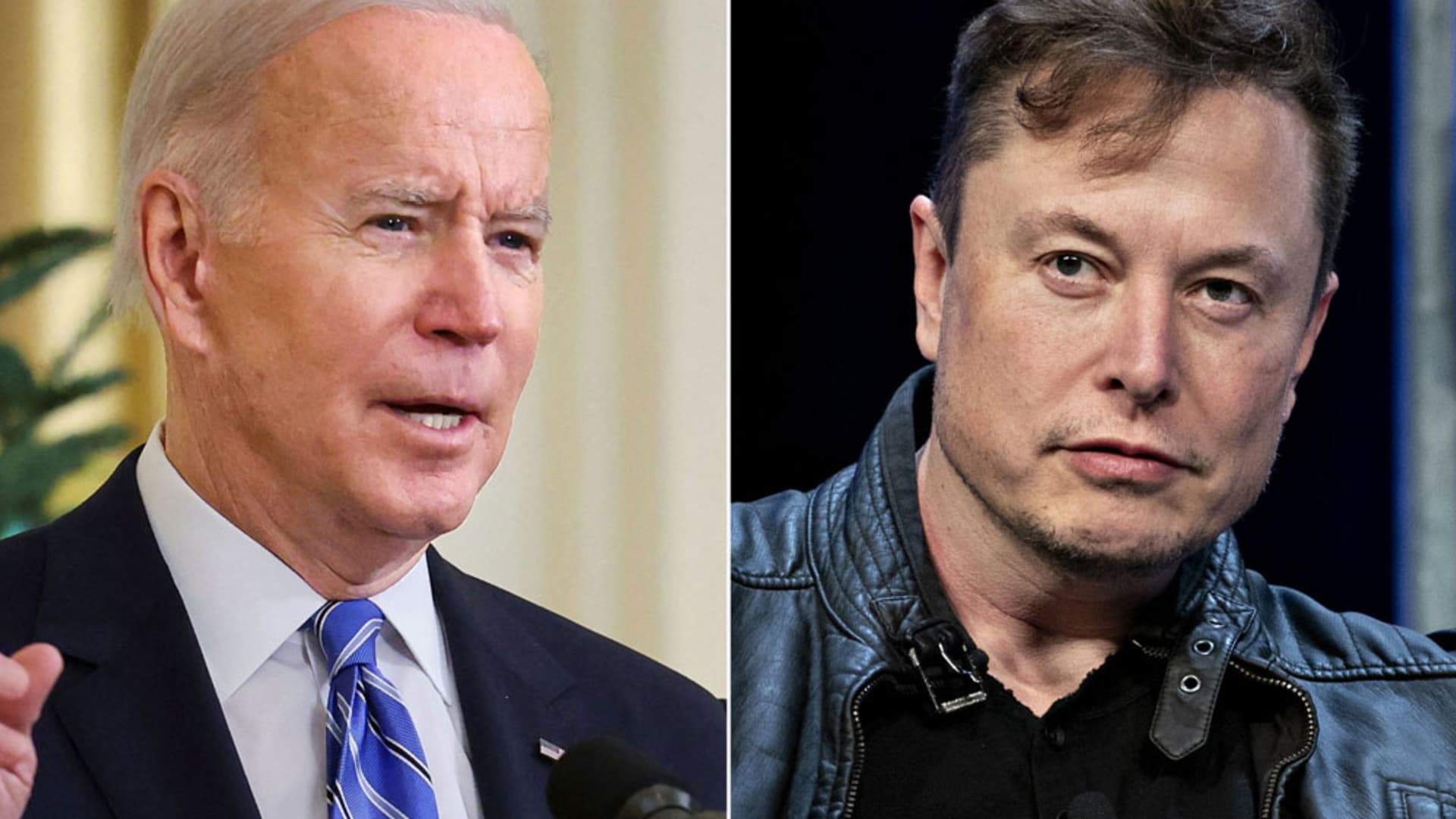President Biden says Elon Musk’s relationships with other countries are worth looking into


Joe Biden, left, and Elon Musk
Evelyn Hockstein | Reuters; Andrew Harrer | Bloomberg | Getty Images
Asked on Wednesday whether Tesla, SpaceX and Twitter CEO Elon Musk posed a threat to national security, President Joe Biden said that the centi-billionaire’s “relationships with other countries is worthy of being looked at.”
At a White House press conference on Wednesday, the President was specifically asked: “Do you think Elon Musk is a threat to U.S. national security and should the U.S., with the tools you have, investigate his joint acquisition of twitter with foreign governments, which include the Saudis?”
Biden said, “Elon Musk’s cooperation and/or technical relationships with other countries is worthy of being looked at. Whether or not he is doing anything inappropriate — I’m not suggesting that. I’m suggesting it’s worth being looked at and that’s all I’ll say.”
Musk is not a fan of Biden and actively bashes Democrats.
Throughout 2022, Musk has accused the President of ignoring his electric vehicle venture, Tesla, despite its success, and favoring legacy automakers and their unions. He has sworn to vote Republican.
On November 7th, as voters were poised to make ballot decisions, Musk wrote on Twitter: “Shared power curbs the worst excesses of both parties, therefore I recommend voting for a Republican Congress, given that the Presidency is Democratic.”
Musk acquired and became CEO of the social network Twitter in a $44 billion deal that closed on Oct. 28. While Musk has invested billions of his significant personal wealth into the acquisition, he also raised funding from outside equity and debt financing partners, and asked some major existing shareholders to roll their stakes into his holding company.
Longtime shareholder Saudi Prince Alwaleed bin Talal owns tens of millions of shares of Twitter, and rather than selling them, he held onto these making the Saudi royal family the second largest shareholder in the social network, now privately held. The kingdom of Qatar also participated in Musk’s Twitter deal.
Twitter has become a go-to platform for politicians to present their views to the public online and to fight with one another and answer some press questions. It is also used by a range of federal, state and local government offices to convey information about everything from climate disasters to missing persons, and by journalists and activists the world over to share their stories.
Recently, Sen. Chris Murphy (D-Conn.) who leads a Foreign Relations subcommittee, sent a letter to the Committee on Foreign Investment in the United States seeking a review of the financing behind Musk’s Twitter deal.
Murphy said in his letter to CFIUS: “Setting aside the vast stores of data that Twitter has collected on American citizens, any potential that Twitter’s foreign ownership will result in increased censorship, misinformation, or political violence is a grave national security concern. Saudi Arabia is one of the most repressive countries in the world, with little to no tolerance for free expression.”
Elon Musk’s aerospace company, SpaceX, previously donated a portion of Starlink internet terminals to Ukraine, which have proven crucial to keeping the country’s military online during Russia’s invasion.
Musk was seen as a hero when Starlink service in Ukraine was first made available. But after the SpaceX founder posted a series of tweets Oct. 3, seeking support for his opinion on the best resolution to Russia’s war on Ukraine, he faced a major backlash.
Musk proposed UN-supervised votes in Ukraine to determine whether certain regions of the nation should join Russia. He also said Ukraine should hand Crimea over to Russia and that the nation should then remain “neutral” rather than aligning with either NATO or Russia.
Kremlin officials praised Musk for his opinion, but the entrepreneur drew sharp criticism from many others, including Ukraine President Volodymyr Zelenskyy, Sen. Lindsay Graham, R-S.C., and Russia-born human rights activist and former chess champion Garry Kasparov.
By mid-October, Musk tweeted that Starlink in Ukraine has cost SpaceX $80 million so far, and will exceed $100 million by the end of this year. He did not mention that SpaceX has also been paid by U.S. Aid, and international governments in Poland and France, among other sources, for this operation. It is not shouldering the cost alone.
The Ukrainian government, which generally praises SpaceX and Musk, is now looking for alternatives to Starlink, Vice Prime Minister Mykhailo Fedorov said last Thursday.
In addition to his ideas on Russia, Elon Musk has sounded off about China and Taiwan and suggested that Taiwan become “a special administrative zone” of China with an arrangement that could potentially be more “lenient” than Hong Kong.
Taiwanese politicians have previously rejected the idea of “one country, two systems” like Hong Kong, and immediately hit back at Musk. But his comments were praised by China’s ambassador to the U.S.
The success of Musk’s electric vehicle company, Tesla, hinges on its access to a range of suppliers and to the broader market in mainland China.
Tesla operates its most efficient, and largest vehicle assembly plant in Shanghai today, although it is building out and ramping up production at two other new factories now, in Austin, Texas and outside of Berlin, Germany.
The Chinese government gave Tesla a loan to help it build that Shanghai plant. And China has allowed Tesla, but no other U.S. automaker, the right to operate its factory independently in the country without forming a joint venture with any other local automaker or manufacturer.